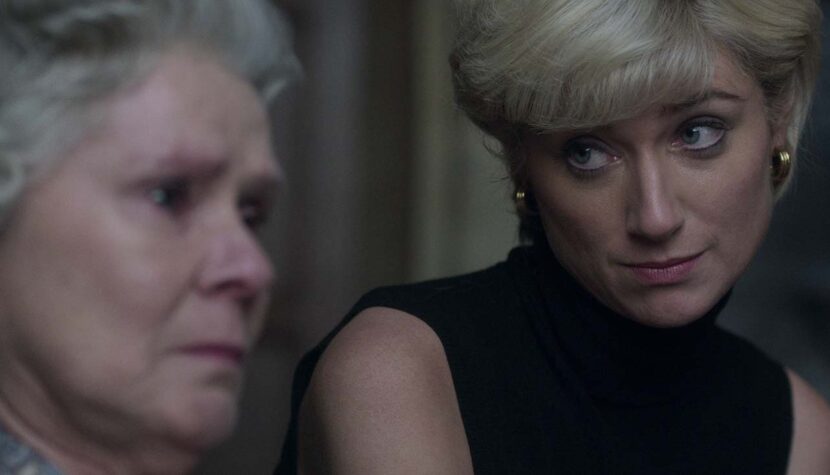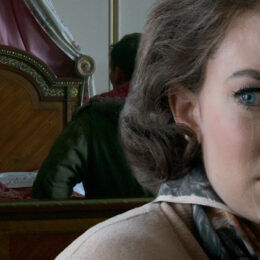THE CROWN – Season 6, Part 1. Shadow of Former Greatness [REVIEW]

It’s been a little over a year since the whole world turned its attention to the English court, bidding farewell to Elizabeth II, who had ruled for over six decades. Now it’s time for the final part of the serialized story of her reign – the concluding season of The Crown. Since its debut in 2016, the series has served as a unique window through which one could peek behind the scenes of the public life of the Windsor family over the years – initially those more distant in time, progressively becoming more contemporary. The sixth series will introduce viewers to the times remembered by most, the turn of the centuries, theoretically dealing with more current topics than the dilemmas of the ’50s or ’70s. So far, we’ve seen four out of ten final episodes, closing the thread of Princess Diana carried over from the previous two seasons.
The fifth season of The Crown concluded with the unprecedented divorce of Charles and Diana, and the four episodes of the sixth series depict its consequences, leading to the tragic end of the princess beloved by the public. Thus, we witness the last months of her life from two perspectives – her personal one, where we see a woman fighting for her freedom from a suffocating marriage but far from being free from the burden of being a member of the royal family, and also from the perspective of the court observing her public actions. Reaching this point in the Windsor family’s history is a double-edged sword for the creators of the series – on the one hand, Diana’s final days seem like a dramatic given, on the other, it’s a theme heavily exploited by popular culture, including the series creator Peter Morgan in The Queen. And it seems that this baggage weighs on the final season of The Crown.
The Diana plot is presented with striking schematics, lacking in innovative staging and character depth. What we get is an overly stereotypical narrative about a beloved but sad and suffering beautiful woman, whose foundation seems to rely more on Wikipedia notes than on in-depth research. Elizabeth Debicki looks excellent as Diana but is not given anything interesting to portray, ultimately becoming merely a nicely looking wax figure. A similar lack of character development plagues the entire cast – it’s not the fault of the usually reliable Imelda Staunton that Morgan provided her with a character almost devoid of personality, resembling a cheaper – one might almost say ‘television’ – version of the role played by Helen Mirren in The Queen. Paradoxically, despite being closer to the present day, the series about the royal family loses vitality and becomes merely a parade of wax figures, a convention it initially tried to distance itself from.
In Netflix’s bold concept, the main cast was changed every two seasons, allowing for credible portrayals of different stages in Elizabeth’s and her family’s lives. This also resulted in clear differences in the various seasons, marked by the change of actors embodying the aging queen. The fifth season introduced the third and final pair of main actors – Imelda Staunton and Jonathan Pryce. It’s not their fault, but this season also brought a noticeable decline in the quality of the series. Season 5, centered more around Charles and Diana, lost its dramatic edge, losing the former freshness of behind-the-scenes court politics. The four episodes shown so far continue this trend, pulling The Crown down, almost towards soap opera shallowness.
Another cast change plays its part here. While there’s no major complaint against the actors playing the main roles, in some cases, there is a lack of coherence between the different seasons. I’m primarily referring to Dominic West, poorly cast as Prince Charles, who doesn’t correspond at all to what Josh O’Connor did in seasons 3-4. There’s also little coherence between the successive incarnations of Elizabeth and Philip, though in this case, well-chosen and professionally capable actors save the situation. The impression of constant resets and characterological chaos casts a shadow over the recent seasons of The Crown, which no longer have the earlier cinematic quality.
It’s disheartening to see how much The Crown has veered towards a polite tribute to the royal family in the final two seasons. Undoubtedly, the tighter control exerted by Buckingham Palace over the creators played a role, ensuring a more careful portrayal of contemporary figures and events than in the case of earlier matters. However, following Peter Morgan’s statements that the series is a love letter to the queen who passed away a year ago, it’s hard to escape the impression that the authors themselves are imposing rose-colored glasses on their narrative. Of course, The Crown was never a subversive or anti-monarchist work; from the beginning, the court representatives kept a close eye on it. However, a key premise of the fictionalized story of the Windsors was their humanization – showing how real people struggled with being molded into the rigid figures of the titular crown’s function. This psychological tension drove the first four seasons, but it evaporated after the second cast change. Season 5 suddenly stopped problematizing, focusing on sugarcoating portraits of individual characters, interspersed with banal comments about the difficulties they faced.
Season 6 brings no change in this regard; if anything, it sweetens even more. Elizabeth no longer has anything human, transforming into a benevolent figure of a noble grandmother we know from television. In theory, this could be defended as a portrayal of the progression into the role of a queen that completely consumes a woman – except that this direction finds no support in the script over the seasons, and Elizabeth in Season 6 is essentially a statistic, lacking depth. It seems more like a lack of ideas to break the dominant vision than a conscious dramaturgical device. Similarly, other characters, especially Charles, lose their nuances, becoming an idealized modern monarch, almost the last just one in court procedures, having little to do with the real Prince of Wales. It was known that in the overall context of the production, we wouldn’t see an overly critical view of the monarchs, but one might miss at least attempts at a less idealized perspective that characterized earlier stages of the series. It doesn’t help that Morgan and company have no sensible idea of how to portray the already well-trodden theme of the last months of Diana’s life, awkwardly combining a second freshness melodrama focused on the princess with a characterless portrait of the queen’s entourage.
Earlier, The Crown was able to portray the times in which the action takes place in an interesting way, basing the narrative on the specific tension between the conservative core of the monarchy and the dynamically changing times. This dramatic aspect is dramatically lacking in the last season – we only have mechanically reproduced motifs of paparazzi and television, devoid of connection with characters outside the elite. The crucial character of the prime minister, present in series 1-4, is almost absent, and there’s also a lack of locational clarity and moments where characters drop their masks and genuinely experience something (unless you count declarative recitations describing feelings). In the face of the lack of an interesting story, pretty frames and visually faithful imitations of real scenes mean little. In Season 6, there’s even a lack of more vivid dialogues or one-liners that the characters of Philip, Anne, or Margaret used to sparkle with. Unfortunately, The Crown is flowing to the shore as a mere shadow of what it was at the beginning, and it’s hard to generate greater interest in the series. One might even be glad that Peter Morgan and company will soon stop tormenting us with the problems of aristocrats confined in a golden cage.”


